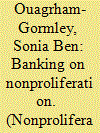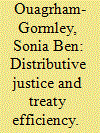| Srl | Item |
| 1 |
ID:
078415


|
|
|
| 2 |
ID:
114436


|
|
|
|
|
| Publication |
2012.
|
| Summary/Abstract |
In the past decade, governments have increasingly relied on financial sanctions to counter the proliferation of weapons of mass destruction. By targeting not only individuals and entities involved in illicit activities, but also banks that allow transactions to occur, financial sanctions were expected to stanch the flow of funds that support proliferation and compel compliance with international law-notably by Iran. Ten years later, Iran's nuclear program has advanced, calling into question the effectiveness of financial sanctions. Previous research evaluating the effectiveness of financial sanctions has focused on the impact of sanctions on the targeted country or on the enforcement of sanctions by the international community. Little attention has been devoted to their implementation by banks and government agencies. Based on interviews with US and European bank and government representatives, this article argues that the inefficiency of financial sanctions is due to shortcomings in training and information support from governments to financial institutions; governments on both sides of the Atlantic have provided little or no assistance to enable banks to identify patterns of proliferation financing and implement the sanctions regime. To transform financial sanctions into effective nonproliferation tools, governments need to play a greater role in their implementation.
|
|
|
|
|
|
|
|
|
|
|
|
|
|
|
|
| 3 |
ID:
112469


|
|
|
|
|
| Publication |
2012.
|
| Summary/Abstract |
Although the issue of knowledge diffusion has been at the heart of nonproliferation research and policies, no study in the political science field has thus far systematically identified the mechanisms that allow the acquisition and efficient use of specialized knowledge related to bioweapons. This analytical gap has led to the commonly held belief that bioweapons knowledge is easily transferable. Studies of past weapons programs, including the former U.S. and Soviet bioweapons programs, show that gathering the relevant information and expertise required to produce a weapon is not sufficient to guarantee success. The success of a bioweapons program is dependent on intangible factors, such as work organization, program management, structural organization, and social environment, which can enhance the advancement of a program or create obstacles to progress. When assessed within smaller state and terrorist bioweapons programs, such as those of South Africa and the terrorist group Aum Shinrikyo, these intangible factors produce the same constraining effects as in larger programs. More important, intangible factors have a significant effect on covert programs, because clandestinity imposes greater restrictions on knowledge diffusion. By taking into account these intangible factors, analysts and policymakers can improve their threat assessments and develop more effective nonproliferation and counterproliferation policies.
|
|
|
|
|
|
|
|
|
|
|
|
|
|
|
|
| 4 |
ID:
135249


|
|
|
|
|
| Summary/Abstract |
This article evaluates the security value of controls over biotechnology transfers and of new restrictions on the spread of scientific results: to what extent do they improve the implementation of the Biological Weapons Convention (bwc)? Although the questions of justice that have plagued the bwc regime since its creation in 1972 have been analyzed extensively, the effects of current controls over dual-use research and the propagation of scientific results on the implementation of the bwc have not been fully addressed. It is argued that although controls over biotechnology transfers increase security because they delay covert programs by creating integration challenges, controls on the spread of scientific results have no security value. They instead may lead to a decreased implementation of the bwc.
|
|
|
|
|
|
|
|
|
|
|
|
|
|
|
|
| 5 |
ID:
068826


|
|
|